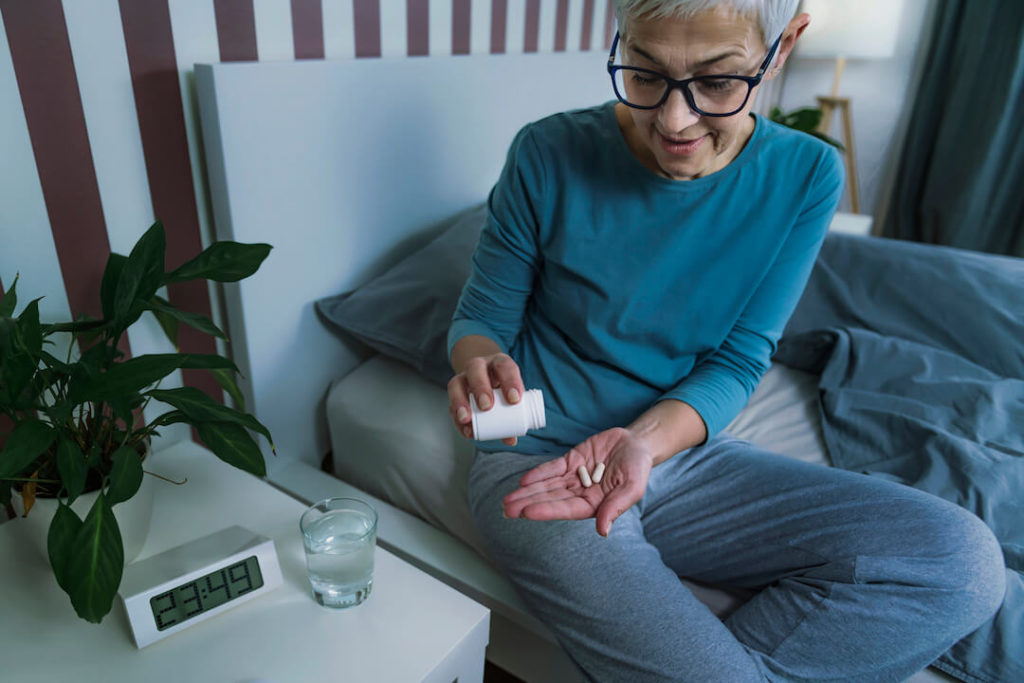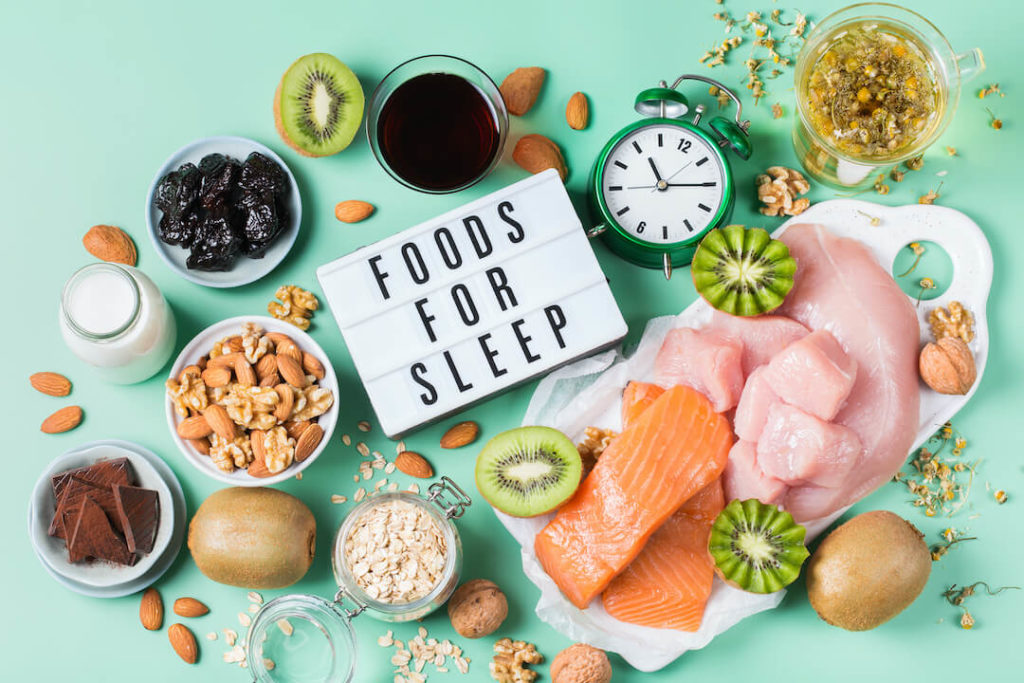This article will discuss all you need to know. Melatonin uses, dosage and side effects. What is it good for, how is it made and how it works to help you sleep.

Lack of Sleep is a Public Epidemic!
Sleep deprivation has become a pressing challenge for millions of people in the US and across the world, big thanks to the misuse of mobile phones and social media for playing a great role in inflaming this issue by keeping people hooked to the virtual world and stimulating their nerves around the clock.
Lack of sleep has become a public health epidemic. A study by the Centers for Disease Control and Prevention (CDC) has found that almost one-third of American adults are not getting the recommended seven hours of nightly sleep.
Sleep deprivation can lead to several health problems, such as obesity, diabetes, heart disease, and stroke. It can also lead to daytime drowsiness, impaired cognitive function, and accidents!
Overview
What is Melatonin?
Melatonin is a natural hormone that is produced by the pineal gland in the brain. It helps to control your natural sleep-wake cycle. It is also used as a dietary supplement to help in resolving your sleep issues.
Alternative Names of Melatonin:
- MLT
- Pineal Hormone or Pineal Gland Hormone
- Melatonina
- Melatonine
- Melatoninaire
What Melatonin Good For?
Here’s what Melatonin does in your body:
- Regulates the body’s biological clock, which can help to promote sleep
- Helps to promote relaxation and calmness, which can help to improve sleep
- Aids in the treatment of insomnia
- Helps to reduce anxiety and stress
Will Melatonin Help Me Sleep?
Yes. There is some evidence to suggest that Melatonin can help treat insomnia. It appears to work best when it is taken as a supplement around 30 minutes before bedtime. However, not all people will respond to this hormone and it may not be suitable for everyone.

How MLT Works in the Body and Helps You Sleep?
MLT works by supplementing the natural levels of this hormone that are already present in the body. MLT levels naturally rise in the evening as darkness falls, and this helps to promote sleep.
How Melatonin Works in The body?
When MLT is taken as a supplement, it can help you sleep by regulating the body’s Circadian Rhythm (the biological clock that controls when we feel sleepy and when we are alert, which repeats every 24 hours) and helping to promote relaxation.
How MLT is Made?
MLT is made from the neurotransmitter serotonin. When serotonin is released from nerve cells, it is converted into hormone by an enzyme called ASMT. It is then transported to the pineal gland, where it helps to regulate the body’s circadian rhythm and promote sleep.
Is Melatonin a Drug?
No. Melatonin is not a drug. It is a Pineal Gland Hormone that is produced naturally by the body in the brain. However, MLT is available in supplement form and can be used to treat insomnia. Always speak to a doctor before taking any type of supplement.
In the USA, Pineal Hormone is considered as a supplement but in some other countries, it is considered as a medication that can only be purchased through a doctor’s prescription.
Who Sells Melatonin?
Melatonin is available over the counter without a prescription. You can find Melatonin in most pharmacies and online.
Uses & Effectiveness of MLT
MLT is most commonly used as a sleep aid, although there is limited evidence to support this use. It may be less effective than prescription medications for the treatment of insomnia and is not recommended as a first-line treatment. MLT appears to be more effective in people with circadian rhythm disruptions, such as jet lag or shift work.
Who Can Take MLT?
MLT is not recommended for everyone. It is usually can be taken by those who suffer from sleep challenges. The doctor is the best person to decide on the supplement or medication you need to take.
What is Melatonin Likely and Possibly Effective For?
MLT is likely effective for the treatment of sleep disturbances associated, such as:
- Blind people’s sleep troubles
- Children with developmental delays
- Chronic fatigue syndrome
- Fibromyalgia
- Insomnia
- Jet lag
- Sleep apnea
- Anxiety following surgery
- Sleep-wake issue
- Cancer’s tumor reduction
- Migraine
- Shift workers
You discuss with your doctor before taking this supplement.

When MLT Does Not Work?
Pineal Hormone does not work for everyone and there are some instances where it may not be suitable.
What is Melatonin possibly ineffective for?
The following are some times when MLT doesn’t work or is ineffective:
- People who do not have a sleep disorder
- People without a circadian rhythm disruption (shift workers/frequent travelers..)
- People with bipolar disorder
- People with autoimmune diseases
- Athletes performance enhancement
- Pregnant or breastfeeding women
- People taking certain medications, such as antidepressants or blood thinners
MLT Dosage
What Melatonin Dose Should I Take?
The dosage of MLT will vary depending on the person and the reason for taking it. It is available in pill, sublingual tablet, and liquid form. The dosage ranges from 0.5 to 5 mg. It is best to start with a low dose and increase as needed.
How Many Melatonin Gummies Should I Take?
There is no standard Melatonin dosage in gummies. It is best to talk to your doctor before taking Pineal Hormone gummies. Generally, MLT gummies are taken as a sleep aid and the dosage ranges from 1-5 gummies.
How Many Melatonin Can You Take in a Day?
Generally speaking, MLT is taken as a sleep aid and the dosage ranges from 0.5-5 mg as mentioned earlier. Again, it is best to start with a lower dose and increase as needed.
How Often can Melatonin be Taken?
MLT can be taken as needed, however, it should be in respect to the doctor’s recommendations. Concerning the timing, it is best to take it around 30 minutes before bedtime.
MLT Safety
Is Melatonin Safe?
Yes, Melatonin is safe for most people when taken as prescribed. However, it should not be taken by the people mentioned earlier without consulting a doctor. It is also important to speak with your doctor before taking MLT if you are taking other medications.
Side Effects of MLT
What are The Side Effects of Melatonin?
MLT should not be considered as a long-term treatment due to the side effects it may cause.
Here are the top side effects of MLT taken by mouth or applied directly on the skin:
- Drowsiness
- Headache
- Stomachache
- Next-day dizziness
- Confusion
- Reduced alertness
- Vivid dreams or nightmares
Melatonin Gummies Side Effects
The MLT gummies side effects are generally mild and include:
- Drowsiness
- Headache
- Stomachache
Warning: Driving cars or other types of vehicles is not recommended after taking Pineal Hormone. You should wait for around 6 hours before driving to ensure you are fully alert.
Cautions and Risks of MLT
When Melatonin Should Not be Taken?
- Pregnancy: Not recommended for pregnant or breastfeeding women
- Some Medications: People taking certain medications, such as antidepressants
- Children: Not recommended for children under the age of 18
- Bipolar Disorder: Should be used with caution in people with bipolar disorder, after taking doctor’s approval
Discuss with your doctor before taking MLT if you are taking any other medications, as it may interact with them.
Pregnancy and Breastfeeding
Melatonin and Pregnancy
There is not enough research to determine if Melatonin is safe for a pregnant woman, therefore, it should not be taken without consulting a doctor.
Melatonin While Breastfeeding
Melatonin is passed to a baby through breast milk, but the amount is unknown. It might slow down breast milk production and ore research is needed. Until more is known, MLT should not be taken by breastfeeding mothers.

The Verdict: There is not enough research to determine if Melatonin is safe for pregnant woman or breastfeeding mom, and there is no standard dosage for them. It should not be taken without consulting a doctor to keep yourself and your baby safe.
MLT Interactions with Medications
Can Melatonin be Taken With Other Medications?
It is best to speak to a doctor before taking Pineal Gland Hormone if you are taking any other medications. MLT can interact with some medications, such as antidepressants, birth control pills, and blood thinners.
MLT vs CBD
Melatonin and CBD (Cannabidiol) are both natural products that offer a range of potential health benefits. MLT is a hormone that is naturally produced in the body and helps regulate sleep. CBD is a compound found in cannabis that has been shown to have anti-inflammatory, analgesic, and antipsychotic effects.
Can I Take Melatonin and CBD Together?
There is not enough research to determine if MLT and CBD are safe to take together or if they have any interactions. It is best to talk to a doctor before taking MLT and CBD together.
Foods and Sleep
Which Foods Promote Sleep?
You may not believe it, but some of the foods you eat can actually help promote sleep.
Can I Find Melatonin in Food?
Yes, Melatonin is found in some foods. MLT levels vary depending on the food and it is not clear how much this hormone is in food. Eating foods that are high in tryptophan, an amino acid that is converted to Pineal Hormone in the body also helps in maintaining an adequate levels of this hormone.

Some examples of foods high in tryptophan which promote sleep include:
- Turkey
- Chicken
- Eggs
- Dairy products
- Cherries
- Walnuts
- Tomatoes
- Brown Rice
- Barley
More research is needed to determine if MLT from food has the same effects as taking it by mouth.
How Can I Increase Melatonin Naturally?
There are some ways that you can increase MLT naturally. MLT production is affected by light exposure, so avoiding bright light before bedtime can help increase its levels. Exercising during the day can also help increase MLT levels, as can avoiding caffeine and alcohol before bed.
Conclusion
Melatonin (also known as MLT or Pineal Gland Hormone) is a natural hormone that is produced by the pineal gland in the brain. It is available as a medication or supplement, but it can also be found in some food products.
Benefits of MLT supplements include helping to regulate the body’s sleep-wake cycle, reducing jet lag, and helping with insomnia. Pineal Hormone is not recommended for pregnant or breastfeeding women, people taking certain medications or children under the age of 18.
MLT should be used with caution in people with bipolar disorder. It can also interact with other medications. Therefore, it should not be taken without consulting a doctor.
There are some ways that you can increase Pineal Gland Hormone naturally. The production of this hormone is affected by light exposure, so avoiding bright light before bed is a good practice. MLT levels vary depending on the food and it is not clear how much of it is in food.
Try to avoid all negative lifestyle choices which would affect your sleep. Exercising during the day can also help increase Melatonin levels, and avoiding caffeine and alcohol before bed.
The most safe and natural way to produce Pineal Hormone in your body is to adjust your sleeping time. Sleep should be in the evening time and the duration should be around 8 to 9 hours.
If you enjoyed reading this article, you may want to checkout Sleeping Benefits For Health.
References: